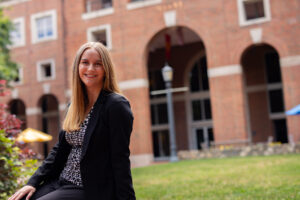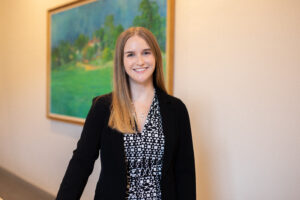News & Stories
The power of the pivot

Chemistry was Sierra Foster’s (BS ’23, MAC ’24) home field. It was familiar and comfortable, challenging but rewarding, and she was good at it.
It was her thing until it wasn’t.
For her first two years at UNC, Foster was a committed chemistry and neuroscience double major — neuroscience was “kind of for fun,” she says — and she did exactly what she had planned. When she wasn’t taking inorganic chemistry, physics or calculus classes, she was most commonly found studying in the library.
By junior year, she already was close to finishing her major requirements. Then she started working in an on-campus chemistry lab. The science fascinated her, but something wasn’t right.
“I didn’t enjoy the atmosphere. I didn’t enjoy what I was doing, standing at the lab bench all day,” says Foster. “With a field like chemistry you have to fully commit, and I realized that it wouldn’t give me the flexibility in my career that I wanted.”

Many would understandably panic. Foster embraced a very big pivot. She weighed her options carefully — law, computer science, engineering or completing a master’s degree in chemistry.
Then she sat in on a class in UNC Kenan-Flagler Business School’s Master of Accounting Program (MAC) through the MAC Mentorship Program. She didn’t have a background in anything related to accounting or finance or business — and she learned that wasn’t required to apply.
After completing her dual undergraduate degree, she moved right into the MAC Program. When she started getting multiple calls from employers during recruiting season, becoming an accountant didn’t just feel real. It felt right.
She earned her MAC degree in 2024 and is now an associate auditor in Ernst & Young’s Raleigh office.
“This degree changed my whole life projection, and I couldn’t be happier that I chose it,” she says. “With accounting, I can move around. I can be an auditor. I can do internal record keeping. I can work for private or public companies. I can do anything. The MAC Program gave me the flexibility that I have always wanted.”
The move to accounting wasn’t entirely out of left field. Her parents own a small family business, Foster’s Jewelers, in Mocksville, North Carolina, where she grew up. Her mother, Marjorie Daniel Foster (BSBA ’85), is a Business School alum. Foster was raised a Tar Heels fan and will always be one. Rooting for UNC Basketball is a hobby, she says.
Staying at Carolina another year and the MAC Program became hard to resist.
The MAC Mentorship Program sealed the deal. Available to all UNC undergraduates, it opens up the world of business to many who haven’t considered it as a career path.
Foster learned about the array of jobs available in finance and accounting through classes, projects and industry networking. She heard from speakers who humanized the profession. One week a CFO came to campus to visit with students; another week, there was an accountant or an auditor.

During her senior year, Foster took a few business courses, including accounting. For someone also interested in computer science and data management, accounting appealed to her.
“I liked accounting from the beginning. I could just see myself as an accountant,” she says. “It’s not necessarily about math, it’s about categorization and that spoke to me. I was like, ‘OK, this is the real thing. I’m going to be an accountant and I’m enjoying what I’m doing.’”
An aspect of the MAC Program she also loved was teaching. She had tutored fellow students in chemistry and became an accounting tutor in the MAC Program. It opened up her future even more.
“I can absolutely see myself teaching accounting one day,” she says. “But I would love to work somewhere in the business of science, maybe with a science technology startup. Innovative science keeps us going, but we would not have it if there wasn’t somebody funding it and keeping track of that.
“What I realized is that I don’t necessarily want to be in the lab doing the work, but I would still like to be next to it, doing that important financial work. I can be lab-adjacent.”